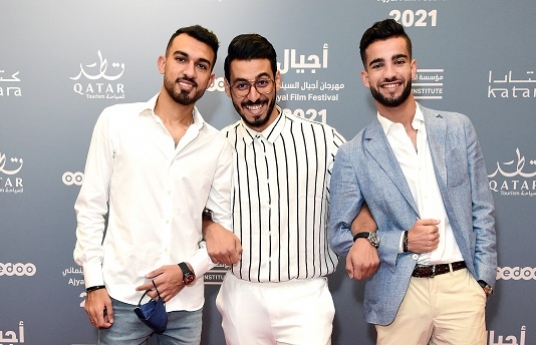أجيال السينمائي يعرض فيلم كباتن الزعتري .. نداء للعالم لمساندة اللاجئين
10 نوفمبر 2021 — المهرجان السينمائي

- استغرق 8 سنوات و700 ساعة تصوير ويناشد العالم بتوفير فرص الحياة الكريمة للاجئين
- صنع مخرج الفيلم على العربي عالماً خاصاً يلهب مشاعر الجمهور معتمداً فيه على شغف بطليّ الفيلم محمود داغر وفوزي قطليش بمعشوقتهما كرة القدم
الدوحة، قطر 10 نوفمبر: بعض الأفلام تحول الخيال لواقع، وبعهضا يحول الواقع خيالاً. وهناك أفلام تصور جزءًا بسيطاً من الواقع دون تجميل لتعمّق فهمنا بالحياة.
كباتن الزعتري (مصر/2021)، الذي يسجل ظهوره الأول في منطقة الشرق الأوسط خلال مهرجان أجيال السينمائي التاسع الذي تنظمه مؤسسة الدوحة للأفلام، هو فيلم يلهبُ مشاعرك بما فيه من طاقة طبيعية وما يبثّه من رسائل متعددة المستويات. هناك الكثير الذي يمكنك أن تخرج به من هذا الفيلم، والذي لا يقتصر فقط على قصة بلوغ بطليه الحقيقيين محمود داغر وفوزي قطليش لسن الرشد.
ومما يزيد الفيلم ثراءً توثيقه لمرحلة نمو محمود وفوزي من مراهقينِ بريئين لشابين بالغينِ أصبحا الآن نموذجاً لمئات الآلاف من الشباب الذين تدور حياتهم في مخيمات اللاجئين وحولها.
عاش بطلا الفيلم في مخيم الزعتري في الأردن، ولهذا جذبت قصة هذين الصديقين المذهلة انتباه المؤسسات المختلفة من الأمم المتحدة للجامعة العربية، فطالبتهما بتعريف قصتهما للعالم لإلهام الشباب الذي يعيشون نفس ظروفهما.
ولم يكن تحويل حياتهما إلى السينما مجرد عمل فني عادي، بل كان يقف وراءه شغفُ المخرج الذي دفعه لاستثمار 8 أعوام من حياته حتى يصنع هذا الفيلم.
وهذا ما يجعل من كلمات علي العربي، مخرج فيلم كباتن الزعتري، على هامش حديثه مع وسائل الإعلام في مهرجان أجيال السينمائي 2021، بالغة التأثير والإقناع.
قال العربي: “صار الفيلم أداة لتوعية العالم حول اللاجئين بأسلوب مختلف؛ توعيةٌ لا يقتصر الهدف منها على سد الاحتياجات الأساسية للاجئين فقط، بل وتذكير أيضاً للعالم بضرورة خلق فرص حقيقية لهم وتمكينهم على نحو يساعدهم في تحقيق طموحاتهم كأي شخص آخر في العالم”.
بعث العربي بذكاء رسالة للعالم من خلال الفيلم تدعوه للنظر في أحوال اللاجئين لا بعين التعاطف فحسب، بل وبالتعامل معهم كبشر لهم كامل الأهلية والحق في حياة أفضل.
قام العربي بـ 21 جولة في مخيمات للاجئين في المنطقة في أثناء التحضير للفيلم وتصويره. وقضى عاماً في مخيم الزعتري ترك فيه الحرية لكاميرته لتصوِّر 80 ساعة التقطت فيها مشاهد غريبة، وكان محمود وفوزي وقتها مراهقينِ سريعيّ الانبهار. علَّق العربي قائلاً: “لعبت معهم كرة القدم كثيراً، ولم استخدم أي مادة تصويرية سجلتها لهم في تلك الفترة، لأن هدفي كان بناء علاقة قوية معهم، حتى لا يكون وجود الكاميرة عامل تشتيت لهم بعد ذلك”.
لم يذهب الجهد الدؤوب الذي بذله العربي وفريقه أدراج الرياح، بل شارك الفيلمُ في 85 مهرجاناً وعُرِض على مسارح في الولايات المتحدة وروسيا، وهناك المزيد من البلدان التي ترحب بعرضه. وقال العربي بأن الفيلم كان ناجحا تجاريا وأنه – أي الفيلم – ساعد أيضاً في جمع تبرعات كبيرة لدعم اللاجئين.
أما التأثير الأكبر للفيلم فكان على المستوى الشخصي لبطليه، إذ قال محمود إن أحلامه ليصبح لاعب كرة قدم قد تغيَّرت، ويؤمن الآن أن لديه مسؤولية تجاه اللاجئين، لاسيما الشباب الذين يتخذونه قدوة هو وفوزي، حيث أوضح محمود الذي لا يزال يعيش في مخيتم الزعتري: “أشعر بأنني متحدثهم الرسمي”.
اختتم العربي: “كل ما نريده من العالم أن يغيّر القواعد التي يتعامل على أساسها مع اللاجئين. لا ينبغي أن يُنظَر لهم في نطاق مساعدتهم في سد احتياجاتهم الأساسية – وهو أمر ضروي بكل تأكيد – ولكن لا يجب أن تكون هي الغاية الكبرى. لنتوقف عن النظر للاجئين كأرقام. إنهم بشر تراودهم أحلام، رسالة فيلمنا ليس لها سقف ولا حدود، إنها نداء للجميع – أنا وأنت والناس كافة – إنها مسؤوليتنا أن نرتقي بحياتهم”.
سيُعرض الفيلم مرة أخرى يوم السبت 13 نوفمبر الساعة 4:30 في قاعات فوكس سينما بالدوحة ويمكن شراء التذاكر عبر الموقع: www.dohafilminstitute.com/filmfestival .
هذا ويقدم المهرجان، الذي يتواصل على مدار 7 أيام من 7 إلى 13 نوفمبر 2021، مزيجاً متنوعاً من الفعاليات التي تقام على أرض الواقع وعبر الإنترنت، وتضم العروض السينمائية والمناقشات التفاعلية والمعرض الفني متعدد الوسائط، وجيكدوم – أكبر فعاليات الثقافة الدارجة في قطر، وسينما السيارات التي تتيح تجربة متعددة الحواس لجميع الأعمار.